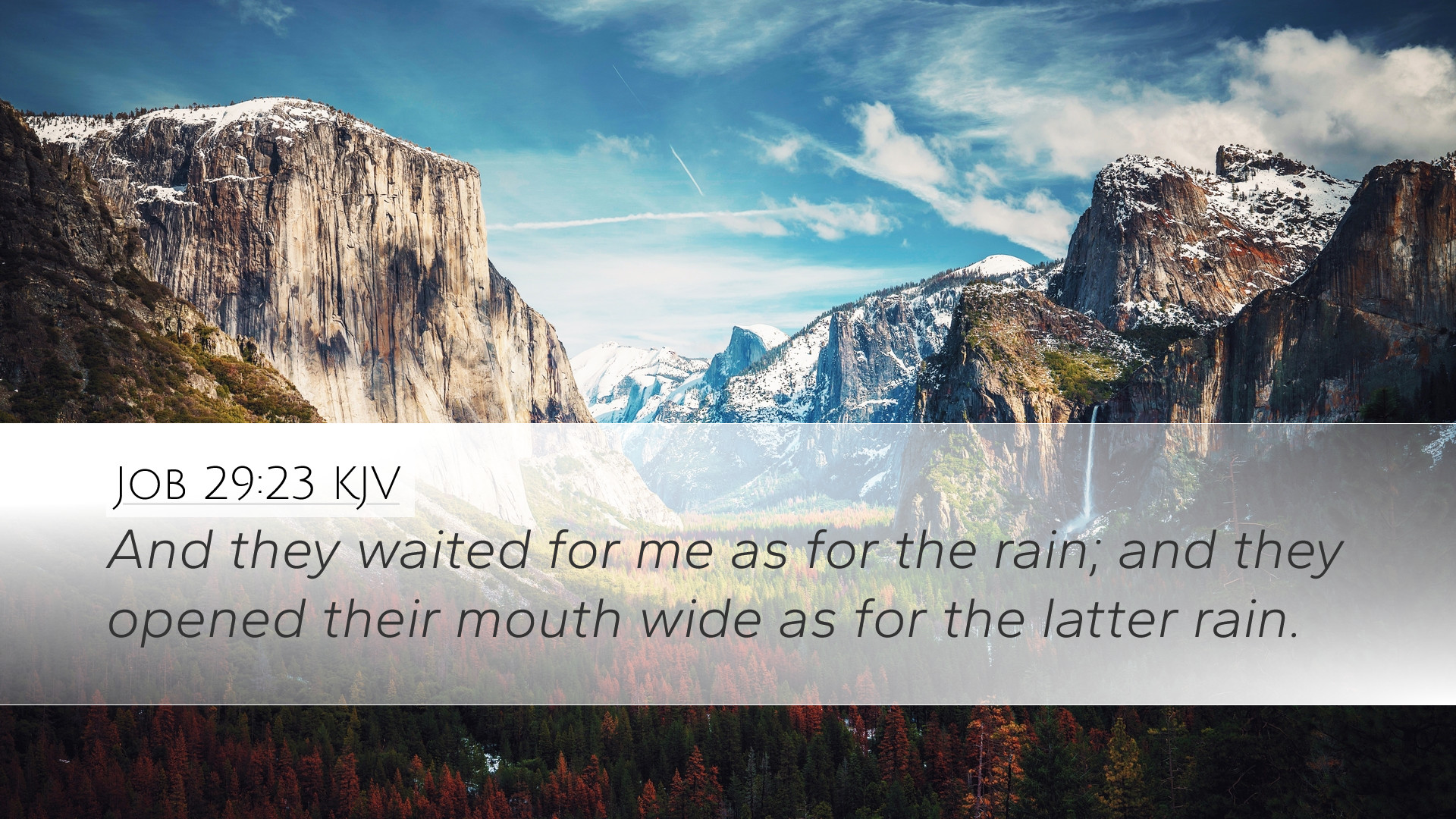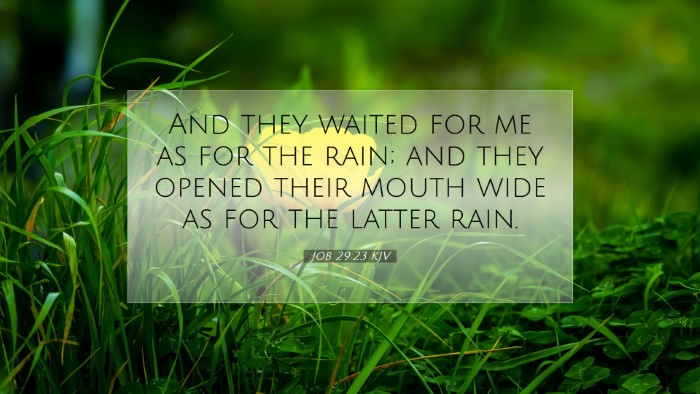Old Testament
Genesis Exodus Leviticus Numbers Deuteronomy Joshua Judges Ruth 1 Samuel 2 Samuel 1 Kings 2 Kings 1 Chronicles 2 Chronicles Ezra Nehemiah Esther Job Psalms Proverbs Ecclesiastes Song of Solomon Isaiah Jeremiah Lamentations Ezekiel Daniel Hosea Joel Amos Obadiah Jonah Micah Nahum Habakkuk Zephaniah Haggai Zechariah MalachiJob 29:23
Job 29:23 KJV
And they waited for me as for the rain; and they opened their mouth wide as for the latter rain.
Job 29:23 Bible Commentary
Commentary on Job 29:23
Job 29:23 (ESV): "They waited for me as for the rain, and they opened their mouths as for the spring rain."
Introduction
The passage from Job 29:23 encapsulates the yearning and hope of the people during Job's time for the wisdom and guidance that he, as a righteous leader, provided. This commentary draws insights from notable public domain commentaries, elucidating the richness contained in this verse and its implications for understanding Job's plight, his relationship with God, and the expectations of community leadership.
Contextual Analysis
The Book of Job grapples with profound themes of suffering and divine justice. Job, a man of integrity, recounts the blessings of his past status as a revered figure within his community. Here, in Job 29:23, he reflects on the anticipated response of his peers during his times of counsel, which was marked by deep reverence and expectation.
- Matthew Henry notes that Job's reminiscence reveals the depth of his previous influence and the respect he commanded among the people. It paints a picture of a leader whose words were awaited with eagerness.
- Albert Barnes emphasizes the metaphor of rain, signifying the nourishment and refreshment that Job's words provided to those seeking guidance. Just as the earth longs for rain, so do people yearn for wisdom.
- Adam Clarke expands on this imagery by linking the spiritual thirst of mankind for divine instruction with Job’s former role as a source of truth and providence.
The Significance of 'Waiting for Rain'
The act of waiting for rain symbolizes a deep longing for revelation and nourishment. The cultural context of ancient Near Eastern societies bore a strong reliance on agricultural cycles, making rain not only a physical necessity but a spiritual metaphor.
- Job’s Role as a Leader: Job acted as an intermediary between God and the people, bridging their need for divine wisdom and guidance. His presence was likened to rain, which sustains and revives.
- Spiritual Implications: The verse highlights the spiritual desolation that arises when such leaders suffer or are absent. It evokes the idea that a community without wise counsel is akin to a barren land.
- Expectation of Wisdom: The verse conveys the notion that wisdom is eagerly awaited, underscoring the communal expectation of a leader to provide insights that quench the thirst of their seekers.
Literary Devices and Their Impact
The metaphors employed by Job in this verse strengthen the emotional weight of his statements. The use of natural imagery, specifically the rain, evokes a sense of life, vitality, and sustenance that permeates the text.
- Metaphor of Rain: The anticipation expressed by his peers brings forth the notion of divine provision. Just as rain is essential for growth, so too is spiritual wisdom necessary for the flourishing of moral and ethical life.
- Imagery of Waiting: The depiction of the people’s stance—open mouths waiting for the rain—illustrates their desperate need for guidance and the critical role of Job's presence and words in fulfilling that need.
Thematic Resonance
This verse invites examination of several overarching themes that resonate throughout the Book of Job and indeed Scripture at large.
- Community and Leadership: The importance of righteous leaders is underscored, emphasizing that leaders possess a profound responsibility to nurture and guide their communities.
- Hope in Despair: This reflection also reveals the hope that sustains individuals in their struggles—the hope that wisdom, akin to rain, will eventually come to refresh their weary souls.
- The Nature of Divine Communication: The passage illuminates how God communicates through chosen leaders, reinforcing the belief that God's truth is often imparted through the wisdom of human vessels.
Application and Reflection
For pastors, theologians, and scholars, Job 29:23 provides fertile ground for reflection on the nature of spiritual leadership and the communal longing for wisdom. Job’s lament and remembrance provoke questions of how modern-day leaders can fulfill similar roles within their communities.
- Reflect on Leadership: Leaders today must strive to be sources of spiritual 'rain,' nurturing their communities with guidance that leads to flourishing spiritual lives.
- Cultivating Expectation: There is an opportunity to foster an environment where congregants expect and value wise counsel, akin to the anticipatory posture described in the verse.
- Diving into Scriptures: As Job's words were life-giving, a deep engagement with Scripture should be pursued to ensure that the nourishment offered is rich and sustains the community in faith.
Conclusion
Job 29:23 serves as a poignant reminder of the vital role played by righteous leaders in the spiritual landscape. The expectations of the community for guidance and nourishment reflect the deep-seated human need for connection with God through wise counsel. As we interpret and apply these truths, may we endeavor to embody the virtues of Job and serve as vessels of divine wisdom in our congregations.


